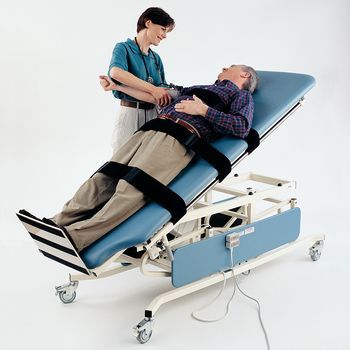Tilt Table Test
in Daytona Beach, FL
If you get dizzy upon standing or have significant blood pressure changes with position changes. A tilt table test can help diagnose what is actually going on in your body.
Cardiac testing can be nerve racking, but we are here to make it as straight forward as possible. No one plans on having heart problems, but if you do you need to find a doctor you can trust. At Complete Cardiology Care we staff Cardiologists and Electrophysiologists that perform tilt table tests on patients in Daytona Beach, Ormond Beach, Palm Coast, Deltona, Deland, and the surrounding areas.
15-39% of people have syncope
Trigger symptoms in a controlled setting
Understand cause of syncope/dizziness

What is a tilt table test?
A tilt-table test is a medical procedure that is used to diagnose an underlying condition in patients who are having unexplained, recurring episodes of syncope. The goal of the test is to trigger your symptoms in a controlled setting.
When is tilt table testing used?
Tilt table testing is used to evaluate syncope in
- Younger, apparently healthy patients
- Elderly patients when cardiac and other tests have not provided a diagnosis
Tilt table testing produces maximal venous pooling, which can trigger vasovagal (neurocardiogenic) syncope and reproduce the symptoms and signs that accompany it (nausea, light-headedness, pallor, hypotension, bradycardia).
Understand why you get dizzy when you change positions
If you are curious about tilt-table testing in Daytona Beach, FL please reach out to us. We are currently accepting new patients. Complete Cardiology Care staffs Cardiologists and Electrophysiologist that serve patients in Ormond Beach, Daytona Beach, New Smyrna Beach, Port Orange, Deltona, Deland, and the surround areas.
Our Cardiologists and Electrophysiologist take nearly all insurances. We accept Aetna, AARP Medicare Complete, Blue Cross / Blue Shield, Cigna, Florida Healthcare, Florida Hospital Care Advantage, Freedom Health, Health First Health, Humana PPO - out of network benefits apply, Medicare, Optimum Healthcare, Railroad Medicare, Tricare, United Healthcare, VHN, Wellcare.
We are also a partner with the VA and are proud to serve those who have served our country!
Self Pay Cardiology services are available too! Call and ask for our price list.

